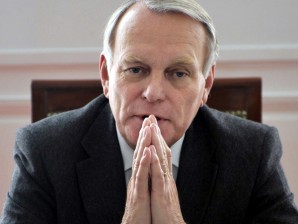
French Prime Minister Jean-Marc Ayrault. AFP file photo
PARIS – French President Francois Hollande’s new prime minister, Jean-Marc Ayrault, arrived at the Matignon Palace in Paris on his first day of work Wednesday and began drawing up a cabinet list.
Ayrault, a 62-year-old former German teacher, lawmaker and longtime Hollande ally, arrived with his wife Brigitte Terrien and said farewell to former president Nicolas Sarkozy’s premier Francois Fillon before getting to work.
Like Hollande, who on Tuesday became France’s first Socialist president since 1995, Ayrault has never previously held a ministerial post, but he is mayor of Nantes, a veteran parliamentarian and seen as a consensus builder.
He was named to the job of prime minister over other potential candidates, including Socialist Party leader and former labour minister Martine Aubry, who reportedly refused to join the cabinet if she did not get the top job.
One of her aides told the Le Monde newspaper that Aubry, who is mayor of the northern city of Lille, saw “no sense” in being a member of Hollande’s cabinet if she were not to be the prime minister.
Hollande has been criticized for naming Ayrault, who has a conviction for favouritism in awarding a local government contract, with opponents noting that as candidate he promised not to work with anyone who had a criminal record.
“I will not have around me people who have been tried and convicted,” Hollande said while on the presidential campaign trail on April 14. “You can remind me of this statement if I fail to keep my word.”
In 1997, after he took over as head of the Socialists in parliament, Ayrault was convicted on favouritism charges for having awarded a municipal printing contract in Nantes to a businessman with links to the party.
He was given a six-month suspended sentence and ordered to pay a 30,000 franc (4,500 euro/$5,900) fine, but the conviction was officially wiped from the record in 2007.
Nevertheless, Ayrault’s track record of keeping parliament’s often-unruly bloc of Socialists in line fits with Hollande’s vow to seek a consensus-building government.
And Ayrault’s background as a Germanophile and German-language speaker should also prove useful in building ties with France’s powerful neighbour and in tackling Hollande’s goal of reshaping Europe’s economic policies.
Unlike many of his peers, Ayrault did not attend the elite Paris schools that produce so many of the country’s leaders and he has criticised the “elitism and condescension” of the capital’s political class.
Much like Hollande, Ayrault has a reputation as a calm consensus-builder and moderate, somewhat lacking in charisma but an operator within the party.
He supported Hollande during the US-style primary that saw him defeat Aubry for the party’s nomination and then played a prominent role as an adviser to Hollande during his campaign.